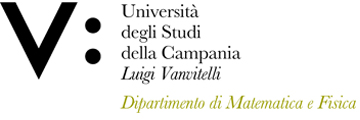Group Coordinator:
Olga Polverino (Full Professor)
Members:
- Chiara Castello (PhD student)
- Suliman Khan (PhD student)
- Francesco Mazzocca (Affiliated researcher)
- Usman Mushrraf (PhD student)
- Vito Napolitano (Associate Professor)
- Paolo Santonastaso (Postdoctoral researcher)
- Ferdinando Zullo (Assistant Professor - rtdB)
Keywords
- Galois geometry
- Finite field
- Incidence structure
- Finite geometry
- Linear code
- Polynomials over finite fields
- Linear and non-linear functions over finite fields
- Postquantum cryptography e code-based cryptography
Research Profile
- Linear sets
Linear sets are substructures of projective spaces defined over a finite field which generalize the notion of subgeometry. Although they have been introduced quite recently, linear sets have been used in several areas of combinatorial geometry and algebra to solve classification problems and to give new constructions, as happened for semifields, blocking sets and more recently for linear codes (in Hamming, rank and sum-rank metrics). The research group aims to construct and classify linear sets with certain properties, which usually arise from their applications such as those that are in correspondence with optimal codes.
- Incidence structures
To reconstruct finite incidence structures and special pointsets from arithmetic relations on their parameters and/or some of their geometric properties is a problem that natural arises in the study of finite geometries. As an example, the study of pointsets in the projective space PG(r,q) starting from their intersections with respect to the hyperplanes of the ambient space to characterize classical objects such as quadrics, Hermitian varieties and subgeometries. In general, the only information on the intersection with the hyperplanes of a pointset does not guarantee a characterization of the fixed set. The study of these objects is also motivated by their relation with linear codes, as every linear code (in Hamming, rank and sum-rank metric) can be geometrically represented via an incidence structure. The research group study pointsets of finite projective space with the same intersection properties with respect to the hyperplanes as quadrics and other remarkable varieties, finding examples which are not classical and give characterization results.
- Polynomials over finite fields
The theory of polynomials over finite fields plays a fundamental role in the study of algebraic properties of finite fields and related applications, as a matter of fact irreducible polynomials are necessary to construct finite fields. The research group focuses on linearized polynomials, that is polynomials which define linear applications, and polynomials with certain properties, such as the property of being permutation or Almost Perfect Nonlinear, deeply connected with cryptography.
- Linear codes and cryptography
Coding theory and cryptography are two fundamental areas of information theory, due to the importance of a fast, efficient and secure way of communicating. Claude Elwood Shannon in 1948 proved that there is always a way of communicating in an efficient way, but there are no general procedures for constructing codes with efficient encoding and decoding algorithms. The research group aims to develop techniques to construct codes via algebraic and geometric tools, and to study their decodability properties, in order to make them useful in practice. The research group is also paying attention to post-quantum cryptography, especially to code-based cryptosystems.
Scientific sectors
SSD: MATH-02/B
ISI web categories: Mathematics and Computer Science
ERC sectors: PE1_15, PE1_16, PE1_2
Group activities
With the collaboration of Marco Timpanella (University of Perugia) and Giovanni Zini (University of Modena and Reggio Emilia), the research group organizes two monthly seminar cycles withing the fields of combinatorics, coding theory and cryptography. The first is dedicated to experienced researchers, whereas the second is mainly devoted to young researchers.
In July 2022 has been organized by the members of the group and other members of the department, a virtual summer school entitled “Contemporary algebraic and geometric techniques in coding theory and cryptography” with a grant from “VALERE:VAnviteLli pEr la RicErca”.
For more details and the material see
https://sites.google.com/view/galoisgeometriesapplications/virtual-summer-school
Other projects in which the members of the group have been recently involved are: GoAL and PQCrypto (VALERE), Research in pairs MFO, DIAMANT cluster.
Web site
https://sites.google.com/view/galoisgeometriesapplications/home
Recent publications








